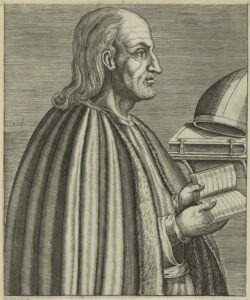Podcast: Play in new window | Download (Duration: 29:49 — 20.6MB) | Embed
Subscribe: Apple Podcasts | Spotify | Amazon Music | Android | Pandora | iHeartRadio | JioSaavn | Podchaser | Gaana | Podcast Index | Email | TuneIn | Deezer | Anghami | RSS | More

St. Anselm, Part 2 – The Doctors of the Church with Dr. Matthew Bunson
- Born: 1033, Aosta, Italy
- Died: April 21, 1109, Canterbury, United Kingdom
- Full name: Anselmo d’Aosta
- Books: Proslogion, More
Dr. Matthew Bunson and Kris McGregor continue their look into the life and teachings of St. Anselm. They explore his background, his time as Archbishop of Canterbury, and his significant contributions to theology.
St. Anselm’s understanding of faith seeking understanding and his integration of faith and reason are highlighted, particularly through his ontological argument for the existence of God.
 Discerning Hearts Reflection Questions
Discerning Hearts Reflection Questions
- St. Anselm’s Contributions and Titles: How did St. Anselm’s diverse titles and travels reflect his significance and influence within the Church during the Middle Ages?
- Anselm’s Spirituality and Humility: In what ways did spirituality and humility shape St. Anselm’s approach to theology and leadership within the Church?
- Challenges and Struggles in Anselm’s Early Life: How did the challenges faced by St. Anselm in his early life, particularly in relation to familial expectations and his pursuit of religious vocation, shape his spiritual journey?
- Anselm’s Leadership and the Feudal Context: Reflect on the leadership qualities exhibited by St. Anselm during his time as an Abbott and later as Archbishop of Canterbury, and how he navigated the complexities of church-state relations in the feudal context of his era.
- The Investiture Controversy and Church-State Relations: How did the investiture controversy shape the relationship between ecclesiastical and secular authorities during St. Anselm’s time, and what insights does his example offer for addressing similar challenges today?
- St. Anselm’s Legacy and Influence: Reflect on the enduring legacy of St. Anselm’s writings and teachings within the Catholic Church, and how his life and work continue to inspire believers to deepen their understanding of faith, reason, and spirituality.
From Vatican.va, an excerpt from the teachings of Pope Benedict XVI General Audience 2009
“Anselm immediately became involved in a strenuous struggle for the Church’s freedom, valiantly supporting the independence of the spiritual power from the temporal. Anselm defended the Church from undue interference by political authorities, especially King William Rufus and Henry I, finding encouragement and support in the Roman Pontiff to whom he always showed courageous and cordial adherence. In 1103, this fidelity even cost him the bitterness of exile from his See of Canterbury. Moreover, it was only in 1106, when King Henry I renounced his right to the conferral of ecclesiastical offices, as well as to the collection of taxes and the confiscation of Church properties, that Anselm could return to England, where he was festively welcomed by the clergy and the people. Thus the long battle he had fought with the weapons of perseverance, pride and goodness ended happily. This holy Archbishop, who roused such deep admiration around him wherever he went, dedicated the last years of his life to the moral formation of the clergy and to intellectual research into theological topics. He died on 21 April 1109, accompanied by the words of the Gospel proclaimed in Holy Mass on that day: “You are those who have continued with me in my trials; as my Father appointed a kingdom for me, so do I appoint for you that you may eat and drink at my table in my kingdom…” (Lk 22: 28-30). So it was that the dream of the mysterious banquet he had had as a small boy, at the very beginning of his spiritual journey, found fulfilment. Jesus, who had invited him to sit at his table, welcomed Anselm upon his death into the eternal Kingdom of the Father.
“I pray, O God, to know you, to love you, that I may rejoice in you. And if I cannot attain to full joy in this life may I at least advance from day to day, until that joy shall come to the full” (Proslogion, chapter 14). This prayer enables us to understand the mystical soul of this great Saint of the Middle Ages, the founder of scholastic theology, to whom Christian tradition has given the title: “Magnificent Doctor”, because he fostered an intense desire to deepen his knowledge of the divine Mysteries but in the full awareness that the quest for God is never ending, at least on this earth. The clarity and logical rigour of his thought always aimed at “raising the mind to contemplation of God” (ibid., Proemium). He states clearly that whoever intends to study theology cannot rely on his intelligence alone but must cultivate at the same time a profound experience of faith. The theologian’s activity, according to St Anselm, thus develops in three stages: faith, a gift God freely offers, to be received with humility; experience, which consists in incarnating God’s word in one’s own daily life; and therefore true knowledge, which is never the fruit of ascetic reasoning but rather of contemplative intuition. In this regard his famous words remain more useful than ever, even today, for healthy theological research and for anyone who wishes to deepen his knowledge of the truths of faith: “I do not endeavour, O Lord, to penetrate your sublimity, for in no wise do I compare my understanding with that; but I long to understand in some degree your truth, which my heart believes and loves. For I do not seek to understand that I may believe, but I believe in order to understand. For this also I believe, that unless I believed, I should not understand” (ibid., 1).
Dear brothers and sisters, may the love of the truth and the constant thirst for God that marked St Anselm’s entire existence be an incentive to every Christian to seek tirelessly an ever more intimate union with Christ, the Way, the Truth and the Life. In addition, may the zeal full of courage that distinguished his pastoral action and occasionally brought him misunderstanding, sorrow and even exile be an encouragement for Pastors, for consecrated people and for all the faithful to love Christ’s Church, to pray, to work and to suffer for her, without ever abandoning or betraying her. May the Virgin Mother of God, for whom St Anselm had a tender, filial devotion, obtain this grace for us. “Mary, it is you whom my heart yearns to love”, St Anselm wrote, “it is you whom my tongue ardently desires to praise”.”
For more from Dr. Matthew Bunson, check out his Discerning Hearts page.
Dr. Matthew E. Bunson is a Register senior editor and a senior contributor to EWTN News. For the past 20 years, he has been active in the area of Catholic social communications and education, including writing, editing, and teaching on a variety of topics related to Church history, the papacy, the saints and Catholic culture. He is faculty chair at Catholic Distance University, a senior fellow of the St. Paul Center for Biblical Theology, and the author or co-author of over 50 books including The Encyclopedia of Catholic History, The Pope Encyclopedia, We Have a Pope! Benedict XVI, The Saints Encyclopedia and best-selling biographies of St. Damien of Molokai and St. Kateri Tekakwitha.


